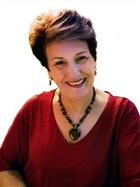In a world dominated by declining advertising support and readership, rising costs and, particularly, increasing competition from online news sources, Beeld has not only continued to hold its own, but this year the Afrikaans Daily celebrates its 50th birthday.
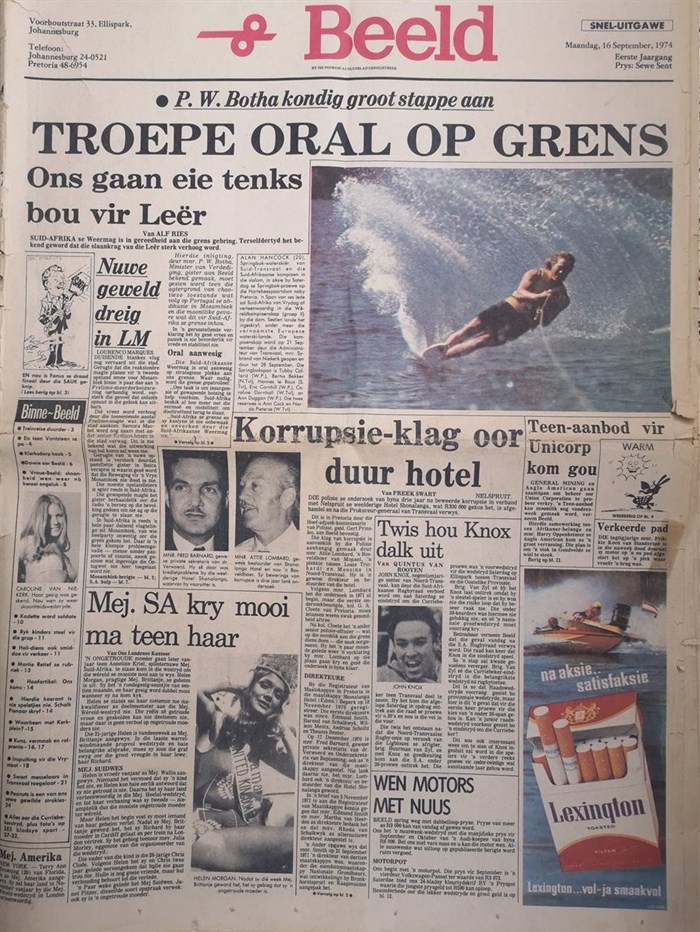
Image supplied. Beeld’s very first cover on 16 September 1974
It is also the only remaining Afrikaans daily print title in South Africa’s northern region.
Beeld editor, Barnard Beukman, is well aware of the changing media landscape, for him, it offers multiple opportunities.
Editor as an important link
Appointed Beeld editor in December 2015, Beukman’s media career has spanned the business side of newspapers (for 11 years) and editorial.
“The business side provided a valuable learning curve to prepare me to be an editor and to have empathy for people on the business side in tougher times,” he says.
For him, the challenge facing the media is to cope with the overflow of information while distinguishing between the mundane and truly unique, quality information. “In this, I see the editor as an important link.”
An important milestone
For Beukman Beeld’s 50th birthday is an important milestone as the natural flow of readers these days is undoubtedly online.
He attributes the success of Afrikaans newspapers in general, and Beeld in particular, during the past few years, to efficient circulation and cost management.
“Those who lament declining newspaper circulations, do not realise that management is hands-on effectively managing the downward circulation trend ensuring Beeld’s endurability and keep availability to key markets in place,” he explains.
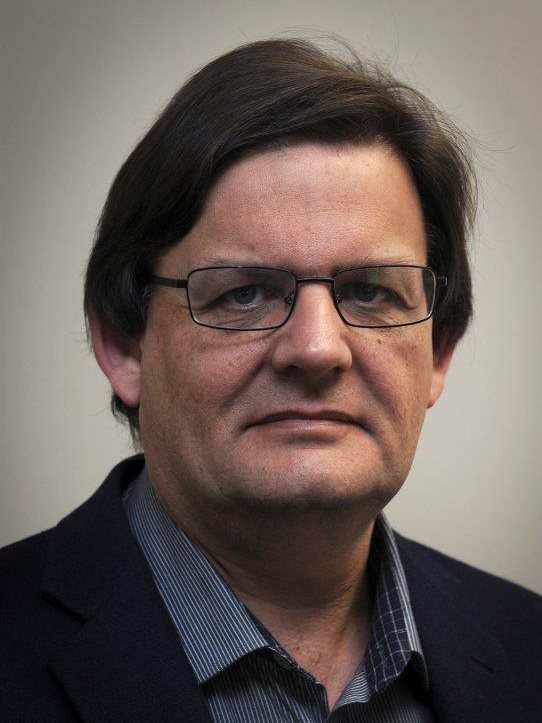
Image supplied. Beeld editor, Barnard Beukman is well aware of the changing media landscape, for him it offers multiple opportunities
A symbiosis
At the same time, a symbiosis developed between the print and online versions, which ensures a home in both for advertisers.
Beeld’s print and online versions, hosted by Netwerk24, are part and parcel of the brand and serve to extend its reach.
Affluence of its readership
“The secret behind Beeld’s financial success is the affluence of its readership,” says Beukman.
“Representing the top quartile of household income and a healthy mix of opinion formers and ordinary South Africans, a third of its readers have no debt.”
Work seamlessly together
While editorial independence is fiercely maintained, Beeld and advertisers work seamlessly together.
This starts when they approach advertisers to offer them the best solutions to reach their target market.
What is different he says is that where they previously tended to view the paper as one-dimensional, they have transformed it into a three-dimensional, interactive and interesting offering.
“This leads to far greater project interaction with readers and advertisers. In the process, social and online media, innovative editorial and other interactive solutions come into play to meet the advertisers’ needs,” he explains.
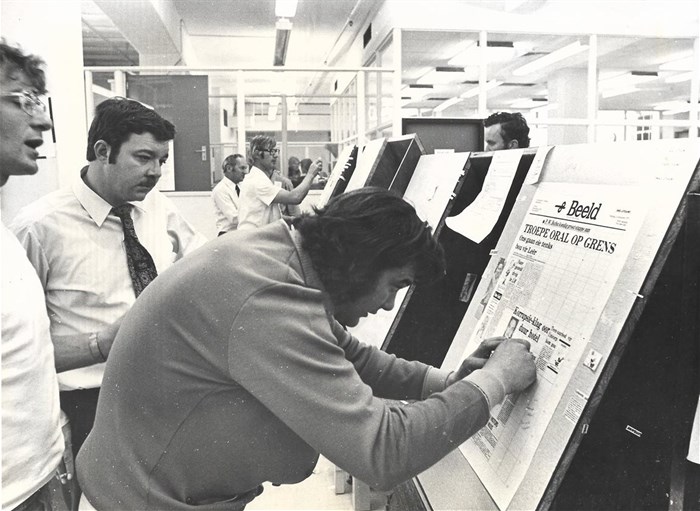
Image supplied. The debut issue of Beeld in the making
Events
In the recent past, older readers have indicated an increasing need to learn about retirement planning and valid investment options, while those in their thirties and forties need financial and career advice regarding their children’s education.
To address these needs and to bring advertisers into the personal space of readers, Beeld hosted an interactive lifestyle event in collaboration with partners where products and services were exhibited, experts and journalists talked about a wide range of topics and readers benefited from lively panel discussions.
Similarly, last year’s Beeld breakfast was completely sold out.
These will become regular events on the Beeld calendar.
Readership
While the average age of Beeld readers is in the late fifties, many retirees, with time at their disposal to read, also enjoy reading the newspaper.
Last year, it was discovered anecdotal through personal feedback and on social media, that people in their late thirties to mid-forties also increasingly started reading Beeld.
“Hence, we commissioned research in this regard. Through their feedback, we learnt that they felt somewhat confused because of an overload of information from all over, but that they enjoyed Beeld because it’s neatly categorised and packaged.
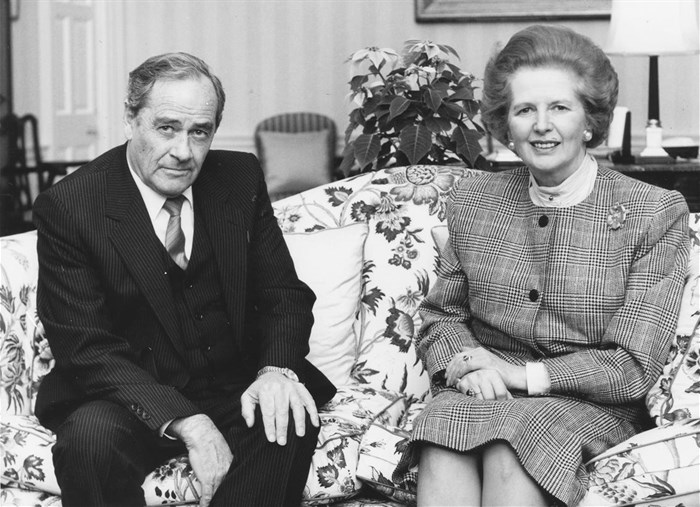
Image supplied. Former Beeld editor, Willem Wepener, with former British Prime Minister Margaret Thatcher
Misinformed public
The South African society is ill-informed.
“Not only are they misinformed by fake news, but also because of a lack of authentic and credible news,” says Beukman.
“In the light of various general elections this year, legitimate, trustworthy information and news are of the utmost importance and in this regard, newspapers will play a key role,” he stresses.
AI: A useful tool
He believes that AI can be a useful tool and has the potential to have an even bigger impact.
However, it needs to be used ethically and correctly.
“Sure, there will always be those who want to manipulate and misuse AI to the detriment of others, so, in their interaction with information, people should not simply trust the odd person knocking at their door with a piece of paper; rather turn to companies, institutions or organisations that have earned a reputation for ethical and sustainable policies and practices,” he cautions.
Therefore it is paramount that companies, institutions and organisations put the necessary guidelines in place and ensure that AI users and practitioners follow them every step of the way.
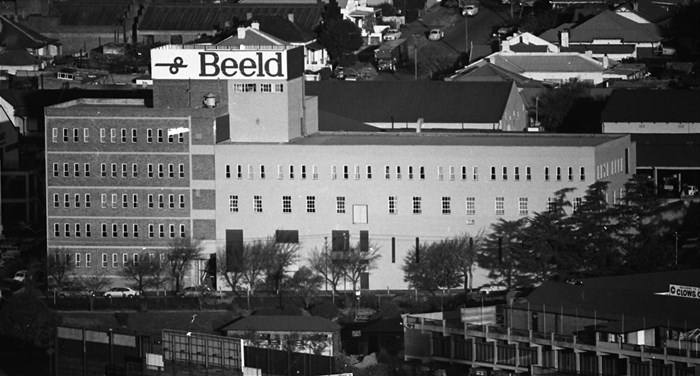
Image supplied. Beeld takes roots in Nieu-Doornfontein, Johannesburg
The future
For decades, the demise of newspapers has been predicted. “Although in the distant future frequencies and formats may change, we still have the energy to forge ahead,” he says.
Two reasons inspire him to continue.
“Firstly, we can interactively help build the business and make a difference for our commercial partners as well as in the lives of our readers.
“Secondly, the positive feedback and words of appreciation from readers, some of whom even make scrapbooks of Beeldcontent, for the efforts our journalists to go the extra mile when necessary.”
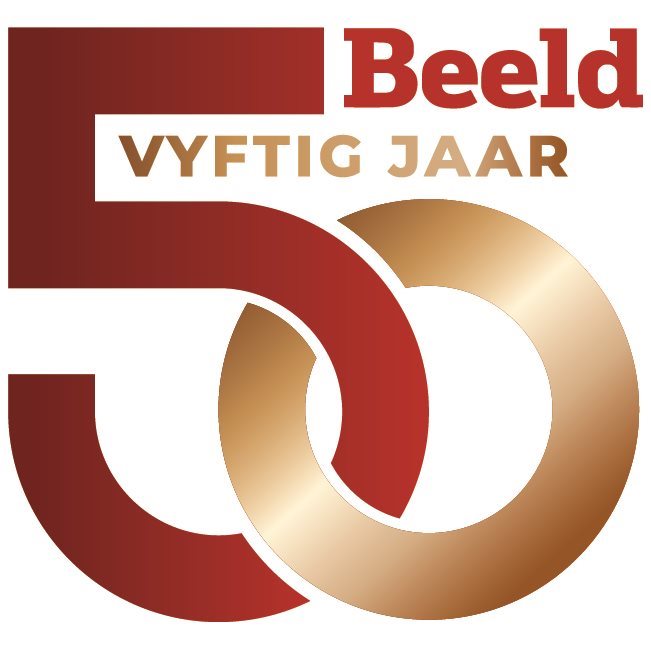
Image supplied. The paper will carry the 50th logo alongside the mast head on the front page for the better part of the year, while each Saturday edition will feature a photo from the archives
50th celebrations
The paper will carry the 50th logo alongside the masthead on the front page for the better part of the year, while each Saturday edition will feature a photo from the archives.
Subscribers have also been treated to a glossy 50th Beeld calendar.
The 50th concept is also being carried through the well-known Beeld events such as Readers’ Breakfast, Women’s Day and Bride of the Year.
The flagship project will be a book, published later this year by Jonathan Ball covering Beeld’s history over five decades, with interesting contributions, and anecdotes, complete with times of fret and fury, by editors, journalists and other contributors.
There may also well be a bumper entertainment event around the daily’s founding date on 16 September.































































